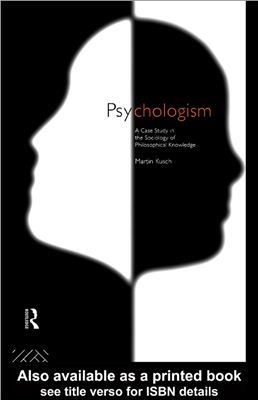Taylor & Francis e-Library, 2005. 345 pages.
When did psychology become a distinct discipline? What links the Continental and Analytic traditions in philosophy? Both these questions are answered by this extraordinary account of psychologism in Germany at the tu of the century.
Martin Kusch explores the origins of psychologism through the work of two major figures in the history of Twentieth Century philosophy: Gottlob Frege and Edmund Husserl. Using psychological and historical reconstruction, Martin Kusch shows how the power struggle between experimental psychologists and pure philosophers influenced the thought of both Frege and Husserl; it not only shaped their agendas but also determined the success of their arguments for disengaging logic from psychology. This debate was crucial in the creation of the separate discipline of psychology.
Kusch has provided an invaluable study for the understanding of a key moment in the intellectual history of the Twentieth Century.
When did psychology become a distinct discipline? What links the Continental and Analytic traditions in philosophy? Both these questions are answered by this extraordinary account of psychologism in Germany at the tu of the century.
Martin Kusch explores the origins of psychologism through the work of two major figures in the history of Twentieth Century philosophy: Gottlob Frege and Edmund Husserl. Using psychological and historical reconstruction, Martin Kusch shows how the power struggle between experimental psychologists and pure philosophers influenced the thought of both Frege and Husserl; it not only shaped their agendas but also determined the success of their arguments for disengaging logic from psychology. This debate was crucial in the creation of the separate discipline of psychology.
Kusch has provided an invaluable study for the understanding of a key moment in the intellectual history of the Twentieth Century.

